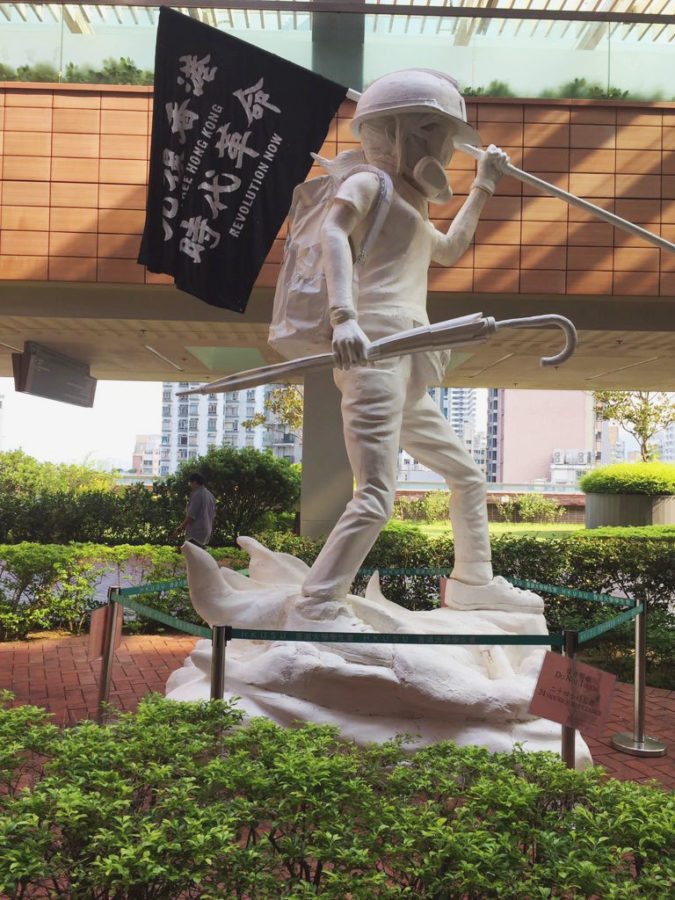Hong Kong Protesters Push for Change
October 2, 2019
On June 9, Hong Kong protests were sparked by a controversial bill introduced by Carrie Lam, chief executive of Hong Kong, that would enable mainland China to extradite fugitives from the city.
Days before the bill was due to have its second reading, hundreds of thousands of protesters marched through the streets of Hong Kong. Among them were families, young, and elderly people, many wearing white to represent justice.
“What we have been fighting for isn’t something huge, we call it 五大訴求 (five big demands),” as said by Mei Qian, a 17-year-old US-born currently residing in Hong Kong.
The Hong Kong protesters since then have issued five demands, which are to release all protestors from custody (1,500 since July), to set up an independent commission and investigate possible cases of police brutality and abuse of power during protests, to stop calling June 12 a riot, for Carrie Lam to step down as chief executive, and the one that sparked all which was to withdraw the ELAB bill. The ELAB bill, or The Fugitive Offenders and Mutual Legal Assistance in Criminal Matters Legislation (Amendment) Bill, would allow criminals to undergo extradition between Taiwan, Hong Kong, and mainland China. Meanwhile, in Hong Kong’s case, their legislative council would have to view extradition case by case and come to a conclusion before criminals could be sent anywhere.
Hong Kong is a part of China but its political system remains democratic, through a concept of “unchanging 50 years”, which the OCTS, One Country Two Systems, would remain unchanged until the year 2047.
Qian explains the potential consequences of this bill being passed and why the people of Hong Kong are on alert with the terms of this bill.
“China is actually trying to communize and take control over Hong Kong quickly and before 2047, which is why we are all sensitive and weary towards any politics connected to Hong Kong,” Qian said. “What we fear is that China will use this bill to take innocent people back to China on trial as the “case by case” thing will pass in China’s favor anyway.”
A question of ethics has risen between protestors and the police, including the use of tear gas against protestors, the use of rubber bullets, excessive violence used against protestors, and sexual assault claims from those who have been put in custody.
“I’ve seen people get arrested for simply doing what is right,” Qian said, “The youngest person [arrested] only being 12 years old, this isn’t the police cracking down on us anymore this is a matter of their attempts of overpowering us and intimidating us. With each passing protest we’ve made they’ve gotten increasingly more violent, and so have we.”
This isn’t China’s first encounter with protests to this extent either, raising questions of whether the protests in Hong Kong will end with the outcome swayed in favor of protestors.
“Tiananmen Square back in 1998, did some good but not a whole lot,” AP World History Christopher Mcmillan said. “You never know the outcome though because China’s got a very odd history of people protesting,”
The global effects of the protests in Hong Kong can even be seen now in the United States.
“You’re seeing a decline in the American stock market right now,” Mcmillan said. ”I think it’ll also stable out as long as the goods are still coming out but in the long term we may see a shortage of good which will lead to a price increase.”
With recent developments of the bill and Carrie Lam not yet formally withdrawing the ELAB bill but proposing to withdraw it at the next Legislative Council of Hong Kong meeting on October 1st.
“We are making progress, even if it is just with Lam suspending the bill,” Qian said. “But we still have a long way to go, we will not back down until our demands are met and until the people of Hong Kong have a voice in their own government.”


